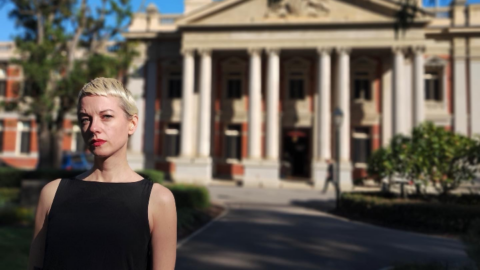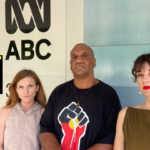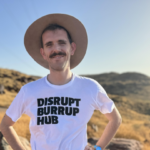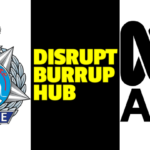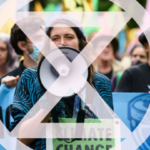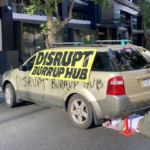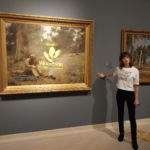Facing 35 Years Imprisonment for Disrupting Burrup Hub: Interview With DBH’s Joana Partyka
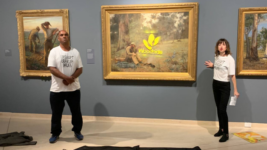
Right now, in the northern hemisphere, across Asia and Africa, the worst heatwaves ever have been playing out all at once. Temperatures have been creeping into the 50 degrees Celsius range, people have been suffering through above-40 degrees heat for weeks on end, and people are dying.
And while some Australians can continue to get away with scoffing at the need to take action on climate and consider delays in traffic worse than 1,300 people dying of heat at Mecca, people on the ground in the Global South are well aware it’s not getting any better and they’re expecting worse.
Indeed, not only can some Australians not feel the heat, but those at the highest levels of government are conveying to the public that the only way out of the crisis is to turn to gas, as while sure, it’s one of the chief fossil fuels causing global warming, at least it’s not dirty coal.
And due to this, over in WA, resource giant Woodside is getting away with establishing Burrup Hub: the largest fossil fuel project here and the biggest gas hub in the southern hemisphere. And if this continues, the Hub will emit 6 billion tonnes of CO2 into the atmosphere over the next half century.
For love of planet
Disrupt Burrup Hub hit the streets running early last year with a series of actions highlighting the Woodside project. And the new climate defence group was also one of the major campaigns that put climate back on the agenda, as the Albanese government had apparently ended the climate wars.
Joana Partyka is one of the small band of climate defenders making up Disrupt Burrup Hub. And she put her liberty on the line in order to alert the wider public to the corporate crimes underway, as the major media players weren’t causing too much of a fuss about it themselves.
Partyka kicked off the campaign as one of two activists involved in a direct action at the Art Gallery of WA. And she further stands accused of alleged involvement in a fake gas leak action at Woodside headquarters, as well as conspiring in regard to a minor action at the Woodside CEO’s home.
The DBH member is now charged with seven counts of causing bodily harm or danger, one act of creating a false belief of danger, one count of conspiracy to commit an indictable offence, and two counts of refusing to obey a data access order, as she refused to hand over her device passwords.
So, taken together, for her troubles, Joana is now facing up to 35 years’ prison time and she faces court on 17 July.
Sydney Criminal Lawyers spoke to Disrupt Burrup Hub’s Joana Partyka about why she considers the Burrup Hub more frightening than the prospect of prison, how the reaction of the WA authorities to DBH’s actions have been extremely disproportionate and how time to save the planet is running out.
Joana, as the name of the group suggests, you undertook all series of nonviolent direct protest actions to disrupt Burrup Hub last year, why? What is it about Burrup Hub that warrants this?
The question we should all be asking ourselves is what is it about the Burrup Hub that doesn’t warrant this kind of response?
Woodside’s megaproject will pump out so much carbon over its lifetime that it qualifies as the most polluting fossil fuel project in the southern hemisphere. It’s 13 times Australia’s current annual emissions, four times bigger than Adani, and among the world’s top 10 carbon bombs.
And it’s on the table at a time we know we must urgently transition away from fossil fuels because our rampant extraction and burning of them is destroying everything we know and love.
These facts alone lay to rest any possible case for the Burrup Hub – full stop, do not pass go, wrong way go back.
But not only is the Burrup Hub still on the table, it’s being force-fed to us as necessary by an ailing political system commandeered by a desperate, dying industry.
They aggressively push the lie that it’s gas alone that permits our standard of living and have engineered a looming shortage they claim threatens it – conveniently, this is one they can only solve with the new gas fields they seek to unlock.
Equally as distressing is the irreversible damage industrial emissions are already causing to sacred First Nations rock art in the area.
We’re talking about the oldest and largest collection of rock art on Earth, and they’re talking about pumping out even more of the toxic chemicals proven likely to destroy it forever.
Both the state and federal governments have made clear just how disinterested they are in acting in our collective interests on this issue.
We know the public’s carrot is no match for the gas industry’s stick. It’s our duty to find a bigger stick.
Woodside and the Burrup Hub are, of course, just one target in a much bigger landscape of large-scale polluters around the world.
We can’t solve the entire climate crisis by stopping this project, but we can stop this project.
For your troubles, you’re now facing a combined maximum of 35 years imprisonment, over a litany of charges. On top of this, you’ve had your house raided twice, and you’ve suffered severe bail restrictions.
How proportional has your treatment been compared to your actions? Have the political, social and environmental points you’ve been making shaped the way you’ve been handled?
In the context of the democratic and legal framework within which we live here in Australia, it’s hard to see our treatment as anything less than jaw-droppingly disproportionate.
I’ve lost count of the number of times our legal team – who’ve seen pretty much everything – have expressed incredulity at the tactics authorities have used against us.
One of our campaigners was subject to a monthslong house arrest. Another had a gun drawn on them. Violence restraining orders, repeated counterterror raids, non-association orders: the list goes on.
However, when you consider our campaign through the lens of the singular influence the gas industry has in Western Australia, the treatment we’ve received in response to our actions makes more sense than not.
The gas industry knows the clock is ticking on business as usual, and it’s using every possible stalling tactic to squeeze out every last dollar they can before the clock strikes midnight.
Disrupt Burrup Hub has served to speed up the clock’s dials. We’ve actively challenged Woodside’s social license, thereby threatening the open slather they’ve enjoyed to date over public resources, opinion and representatives alike.
There is no doubt that’s what’s behind the extreme crackdown against us. It’s entirely political.
Last year DBH achieved much by way of raising awareness about the Hub and the climate catastrophe. You were arrested and charged, monitored by police and the ABC handed over its documentary footage of your group to the WA police.
But this year, the authorities took a new approach quite early on as they threatened to sue protesters for the damages caused by their nonviolent direct actions.
Can you talk about how the playing field has changed this year? And how is that currently affecting the campaign?
The backdrop against which the campaign works today has shifted as swiftly and markedly as the repression we’ve faced.
From a practical standpoint, the criminal proceedings many key organisers are battling have had a significant impact on the campaign.
I don’t want to say it’s stifled us per se, but the effect is noticeable. It’s far more challenging to organise effectively when the state is watching your every move.
It’s far more risky to engage in direct action when the state is endlessly adjourning court matters that keep you trapped on bail.
Woodside itself has also brought civil litigation against myself and two other Disrupt Burrup Hub campaigners, claiming to have suffered losses as a result of a protest action at its Perth headquarters last year.
Far from a genuine attempt to recover material damages, the company is engaging in strategic litigation against public participation, or a SLAPP suit.
Our treatment has also impacted the broader climate movement, both in WA and beyond.
While Disrupt Burrup Hub’s work has certainly spurred folks around the country into taking direct action, it’s also served as a cautionary tale.
Who’s going to want to stand up against the likes of Woodside when the consequences for doing so are so extreme?
The DBH campaign is part of the global climate movement, and Burrup Hub is just one project amongst many that are currently expediting the climate crisis.
Where do you consider the climate crisis to be at? And considering this, how is our political class dealing with this situation at present?
Amongst all the uncertainty of my current context, the continuation of the climate crisis is probably the one sure bet that remains.
I hold close to zero faith in Australia’s two major parties when it comes to meaningful action to mitigate our emissions.
The Liberal and Labor parties of today are nothing more than warm host bodies for the parasitic industries that sell us down the river if it means they can keep selling their product.
That is, unless we see some kind of significant political reform that cleaves industry from the policy-making process, and I’m afraid the major parties are not up to that job either.
We can exercise our right to vote all we like – and we absolutely should – but electoral politics will not save us.
What will save us is us.
And lastly, Joana, you and others from DBH are facing court very soon. What’s coming up for you? And how is the Disrupt Burrup Hub campaign shaping up at present?
My immediate priority is to continue to fight the various criminal and civil proceedings against me. I have a succession of court dates looming, including a Supreme Court hearing next month in relation to Woodside’s SLAPP suit.
I’m also awaiting the outcome of my Supreme Court appeal against a couple of convictions I received late last year.
It’s all been an extraordinary test of my mental, emotional and physical health – a test I don’t always feel I’m acing – but it’s primed me for the next phase of my life in ways I probably can’t even comprehend right now.
And ironically, all the efforts put into silencing me have only served to help me find my voice.
In many ways, my individual experience is broadly reflective of the campaign itself. For more than 18 months Disrupt Burrup Hub has been all systems go: agitating, growing, escalating. Celebrating. Commiserating.
Such extraordinary highs and lows inevitably take their toll.
That experience has led us to a natural point of taking stock of what has been, and to consider what comes next – in particular, how we grow the spark of our campaign into the raging inferno of civil resistance we need to keep this planet liveable into the future.
